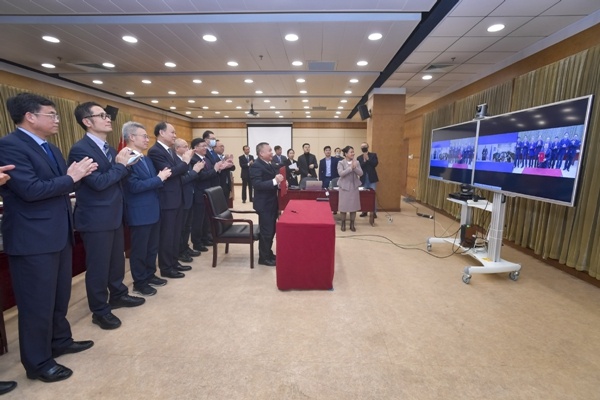
China and Russia have agreed to join hands in building and running a robotic scientific outpost on the moon or in lunar orbit, according to the China National Space Administration. (Photo: chinadaily.com.cn)
China and Russia have agreed to join hands in building and running a robotic scientific outpost on the moon or in lunar orbit, according to the China National Space Administration.
The administration said in a statement on Tuesday evening that its head, Zhang Kejian, and his Russian counterpart, Dmitry Rogozin, director-general of state space corporation Roscosmos, signed a memorandum of understanding on joint efforts to build an "international lunar research station" during a teleconference earlier that day after receiving approval from both governments.
The CNSA and Roscosmos will negotiate on matters about the station's planning, design, construction and operations, and will work together to build and run it. Both nations want to open the station to international cooperation so it can serve as a platform to boost scientific exchanges and foster peaceful exploration and development of outer space, according to the statement.
It said that the station will be a base on the lunar surface or in a lunar orbit for comprehensive scientific research and technology demonstration.
The statement said that through this program, China and Russia will take advantage of their expertise and experience in space science and technology and spacecraft to produce a plan for the station and will cooperate closely on the following steps.
The two countries have been cooperating for years on space science, technology and application fields, and have signed several agreements on lunar research to promote collaboration on lunar and deep-space exploration, it said. The two nations will work together to carry out China's Chang'e 7 lunar landing mission and Russia's Luna-Resurs-Orbiter mission, the statement added.
Pang Zhihao, a retired researcher at China Academy of Space Technology, said that both nations have their own advantages in terms of lunar exploration and their cooperation will be reciprocal.
Pang said that Russia, then part of the Soviet Union, "launched 24 robotic probes to explore the moon from the late 1950s to the mid-1970s and achieved a lot. It has great experience in moon missions as well as some well-developed, mission-proven equipment such as its rocket engine and lunar observation devices. Compared with the United States and Russia, China is a latecomer to lunar programs, but it has performed several successful missions and has advanced technologies".
The scientific outpost program will give a strong boost to the nations' lunar exploration capabilities and bring benefits to the entire world, the researcher said.
China's landmark Chang'e 5 mission, which brought 1,731 grams of lunar rocks and soil back to Earth on Dec. 17, achieved the historic accomplishment about 44 years after the last lunar substances were brought back from the moon. It was China's first space mission that retrieved lunar samples, and made China the third country to achieve this feat, after the U.S. and the former Soviet Union.


